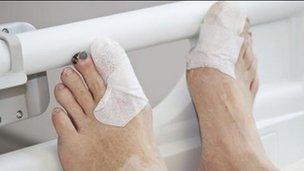'Feet first' for diabetes patients
- Published
- comments

People with diabetes often develop foot problems
As a new study highlights major variations in diabetes-related foot amputation rates, Barbara Young, chief executive of Diabetes UK, explains why action is needed to cut rates of preventable amputations.
If I were to tell you about a place where thousands of feet were amputated every year as a result of poor healthcare, you would assume I was talking about somewhere in the developing world.
Well you'd be wrong. The fact is that here in the UK, thousands of people with diabetes have amputations every year.
Not only does an amputation dramatically reduce quality of life, but the likelihood of dying within five years is greater than for breast, bowel or prostate cancer.
And yet an estimated 80% of the 5,000 diabetes-related amputations a year in England could be prevented through better healthcare and improved management of the condition.
The fact that so many people are needlessly having their feet amputated is a national disgrace. And yet despite the large numbers, awareness of the problem is worryingly low even among people with the condition.
But it does not have to be like this.
The scandal of preventable amputations is one we hope to bring to an end with our Putting Feet First campaign. Over the next five years, we want the number of amputations in people with diabetes to reduce by 50%.
Raising awareness of the issue will be a big part of this.
'Insufficiently thorough'
The 2.8m people in the UK who have been diagnosed with diabetes should know how important it is to manage blood glucose levels, cholesterol and blood pressure well, as well as checking feet regularly and making sure shoes fit properly.
But they also need to know what healthcare you should expect - because all too often it falls short of what people are entitled to.
Firstly, everyone with diabetes should get an annual foot check.
These are important for identifying problems at an early stage, but many thousands of people are not getting them. And when they are being done, they are sometimes insufficiently thorough.
I have even heard of foot checks where the patient is not even asked to take their shoes and socks off!
Also, at the end of the check patients should be told what their risk status is, so if this does not happen then you should ask.
Secondly, if you have a foot ulcer then you need to be seen by a diabetes specialist foot care team as soon as possible.
It should certainly be within 24 hours, as an ulcer can deteriorate in a matter of hours.
Some areas are already doing well in terms of getting diabetes-related ulcers referred to these specialist teams within 24 hours.
But there are also poorly-performing areas where this does not happen.
Tragically, that omission can be the difference between someone keeping their foot and losing it.
If people with diabetes are not offered this level of care, they should insist on it and complain if they don't get it.
But the point is that decent healthcare is something everyone should get as a matter of course.
For this to happen, we need to address the reason that large swathes of the country are doing so badly.
We know from speaking to health professionals that many of them are desperate to give people with diabetes the best possible foot care but feel unable to do so under the existing system.
This is why the government needs to show leadership on this issue by insisting that all areas of the country offer the same standard of care that is already available in the best areas at the moment and monitoring and managing standards to ensure that they are being delivered.
This greater political will is the only way to bring an end to the tragic postcode lottery of amputations and in doing so create an NHS that really does put feet first for people with diabetes.